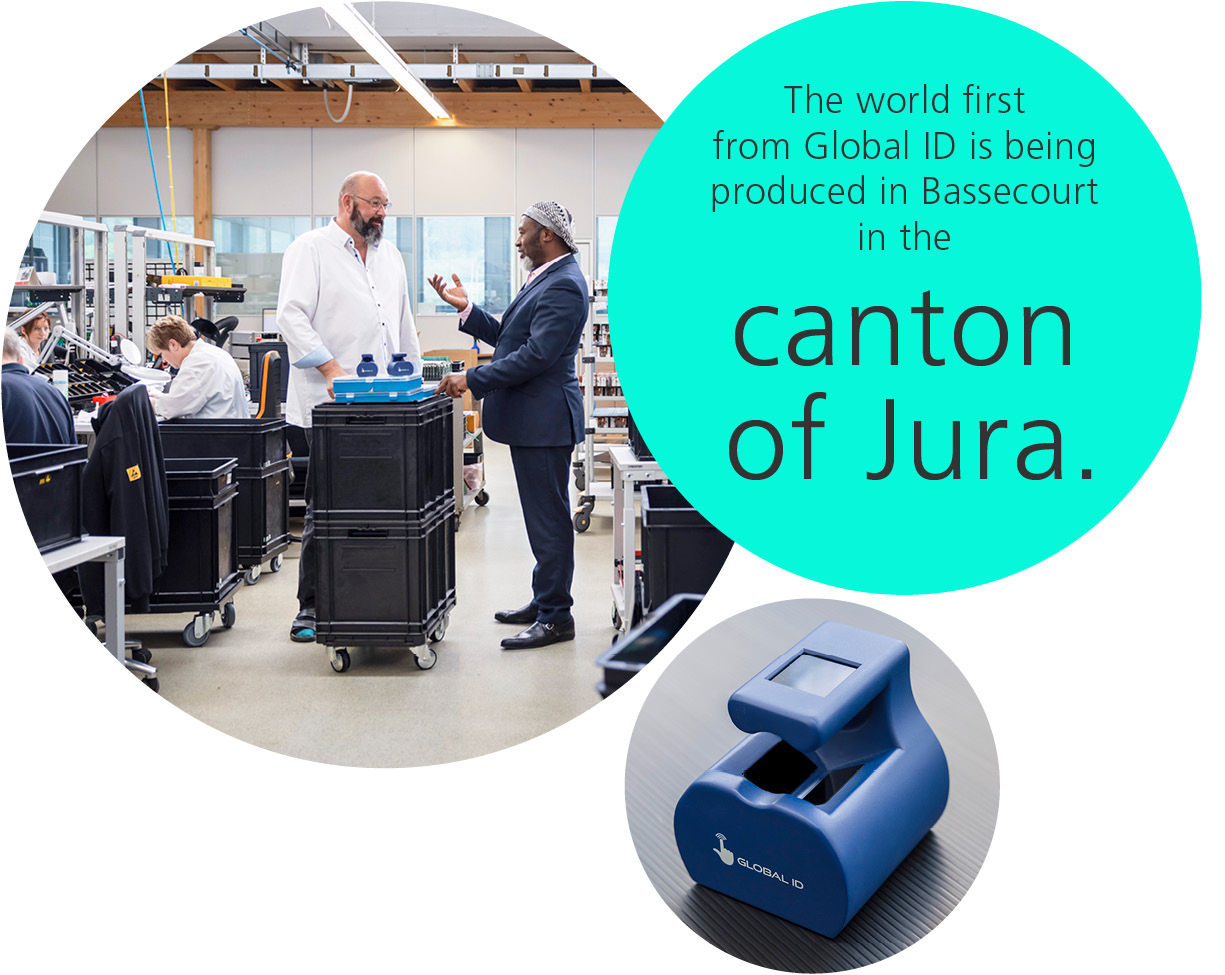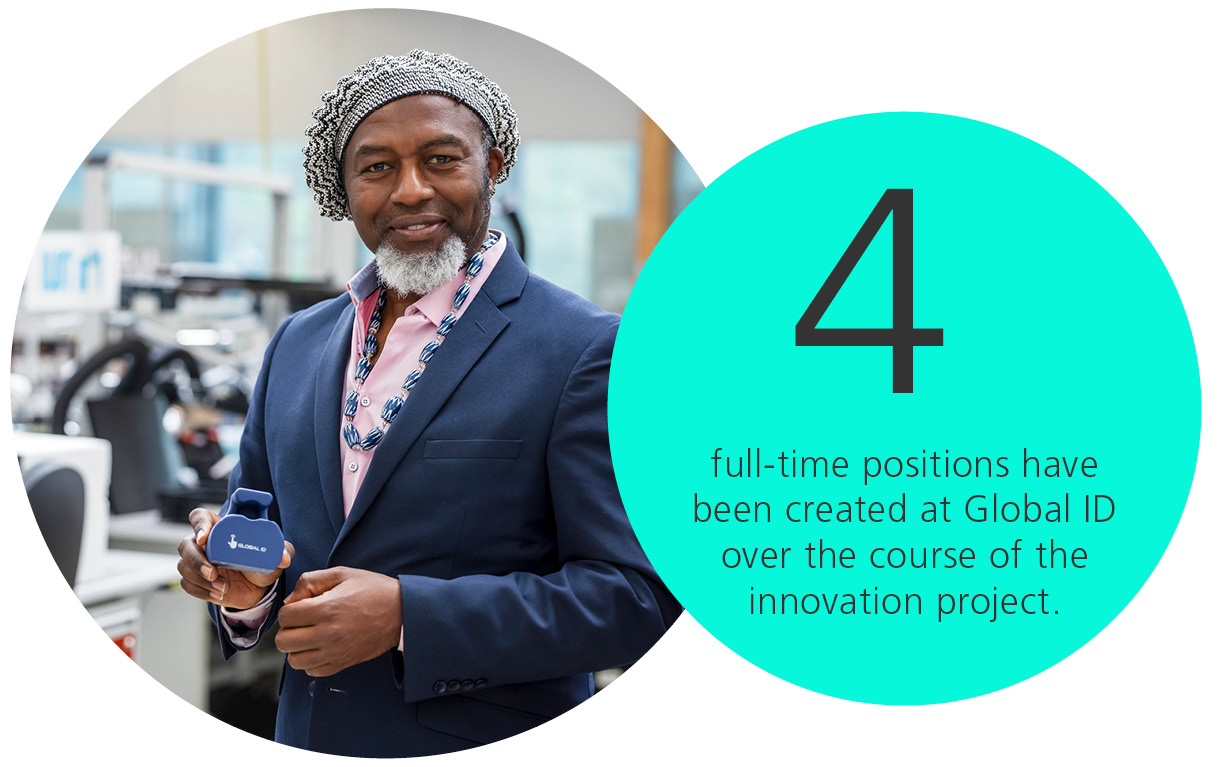Lausanne-based start-up Global ID wants to revolutionise biometric identification – with vein scanning. This world first produced in the Jura brings with it great economic and social benefits: By 2030, 100 jobs are to be created in Switzerland, and in the long term, the new process could provide many undocumented individuals with an identity. Innosuisse facilitated the development of the technology as part of an innovation project with the Swiss Federal Institute of Technology Lausanne (EPFL).

The device has what it takes to be a real game changer. The VenoScanner could replace established biometric identification methods – such as the fingerprint scanner or facial recognition. “The surest key to our identity is hidden in our veins.” Lambert Sonna is convinced of this fact. The massive benefit here is that, unlike with standard methods, individuals can only be identified with their consent.
The CEO of Global ID holds a brand-new product in his hand. Production has recently begun. What began in 2016 with an innovation project by Innosuisse at the EPFL is now a fully developed product. Finally, the university spin-off can reap the rewards of around six years of development work.
16-strong team leads innovation project to success
The road to a market-ready product was a long and rocky one. Ten years ago, Lambert Sonna decided to put his business idea into action. The Cameroon-born cryptologist[A1] was a master’s student at the EPFL at the time. Developing the technology would be expensive – that much was certain: “The project brought together the disciplines of biometrics, data analysis and cybersecurity. Correspondingly high amounts had to be invested in research and development.”
The funding from Innosuisse made the development of our technology possible in the first place.
Innosuisse made putting this into action possible and provided the funds required in order to do so. Three major research institutions in French-speaking Switzerland all played their part in the three-year innovation project: the Security and Cryptography Laboratory (LASEC) at the EPFL, the Idiap Research Institute in Martigny and the HES-SO Valais university in Sion. In 2019, the 16-strong team achieved the project goals on time. Initial tests confirmed the following year: the scan works across all skin colours.
Over the course of the innovation project, four full-time positions have been created at Global ID. As the technology came into its own, the staff turned their focus to product development. “The biggest challenge was miniaturisation,” says Lambert Sonna. Over the course of two years, a bulky box the size of a fruit crate transformed into the fist-sized VenoScanner.
Interview with Lambert Sonna, CEO
Good prospects on the world market
The name of the Lausanne-based start-up speaks for itself: Global ID has patented the innovative technology worldwide. The patent has already been successfully applied for in Switzerland, and the USA has also given the green light. Europe and Asia should also be at this stage by 2024. “These processes are lengthy and costly, but we wouldn’t get far without patents and certifications,” Lambert Sonna notes.
There are one billion undocumented individuals in the world. Our technology could help provide them with an identity.
Global ID is active in marketing on a global scale as well. Lambert Sonna is meeting with interested parties from Switzerland, but also from the USA, several African countries and Malaysia. The target group is broad: while the innovation project used to focus on healthcare, other sectors have since been added, including finance, telecommunications, education, authorities and the military. To expand the range of applications, Lambert Sonna is already working with students from the EPFL on new innovations. While the current product detects the veins in an individual’s index finger, palm scanning should soon be possible from longer distances. The initial tests were positive. Additionally, artificial intelligence is to speed up the identification process even further.
Sustainability at all levels
The world first is being produced in Bassecourt in the canton of Jura. For Lambert Sonna, it was clear that the VenoScanner had to be manufactured in Switzerland. Safety is a key selling point, after all, and the product now also boasts the world-renowned label “Swiss Made”. Global ID found the right local partner in Locatis SA, a leading manufacturer of electronics modules. “We’re able to produce up to 1,000 units per month,” says Director Patrick Muller. The Jura native likewise believes there is great market potential here and hopes to make a considerable contribution to the SME’s turnover as early as next year.
The innovation project is thus having an impact as far as the Jura. In addition to the positive economic effect, the social benefit is also very significant – with the ethically unobjectionable identification process ultimately benefitting society as a whole. The project has also proved to be sustainable in environmental terms: “We have a recycling concept and hope that our technology will one day replace badges,” says Lambert Sonna. A lot of plastic could be saved as a result.
Last modification 27.12.2023






